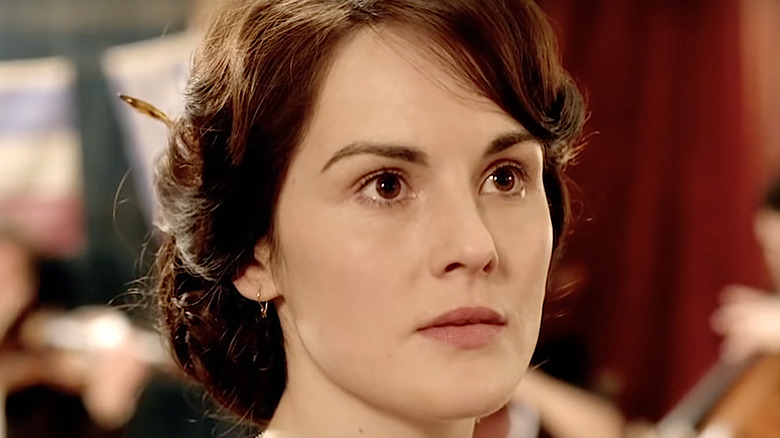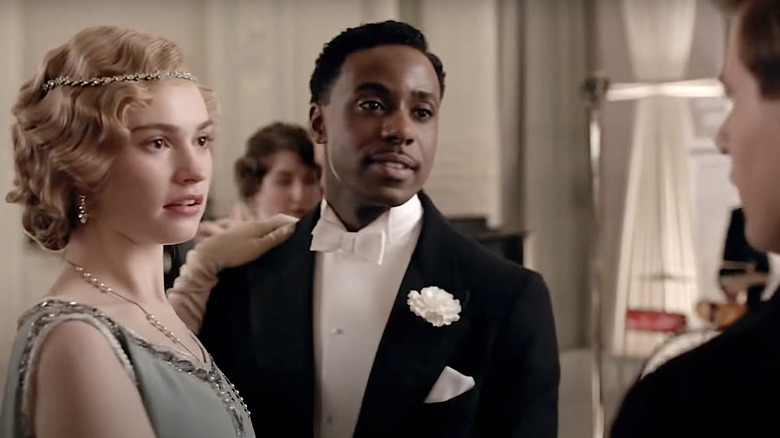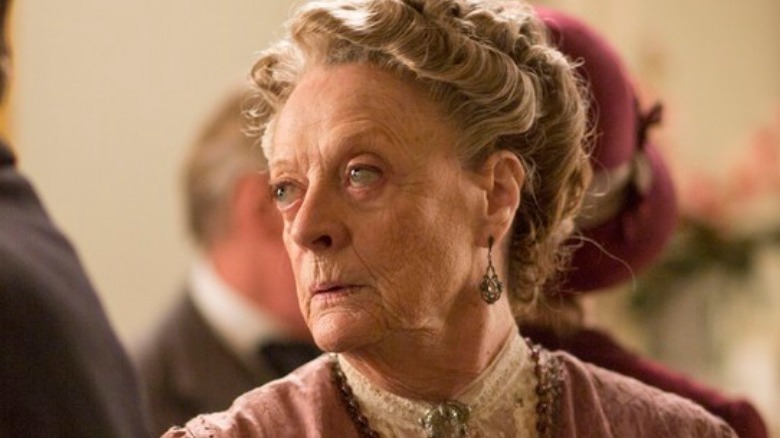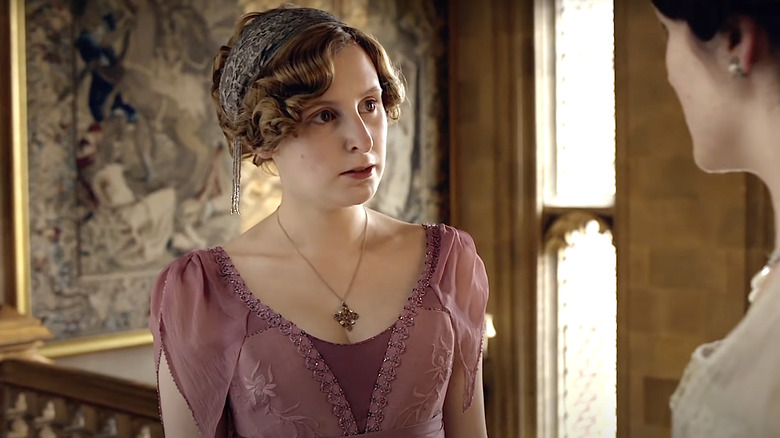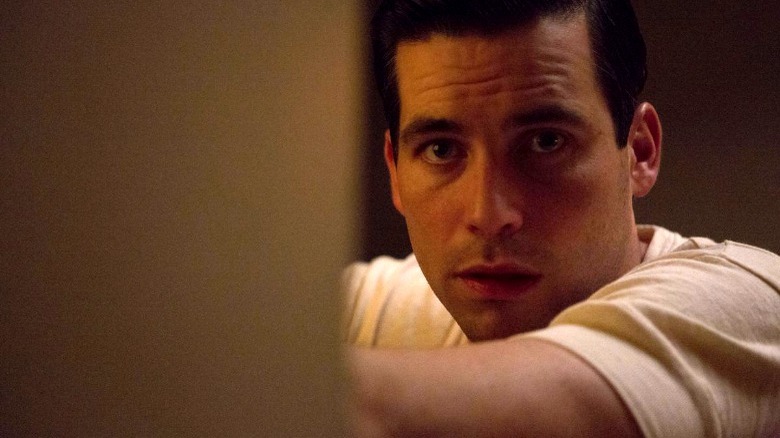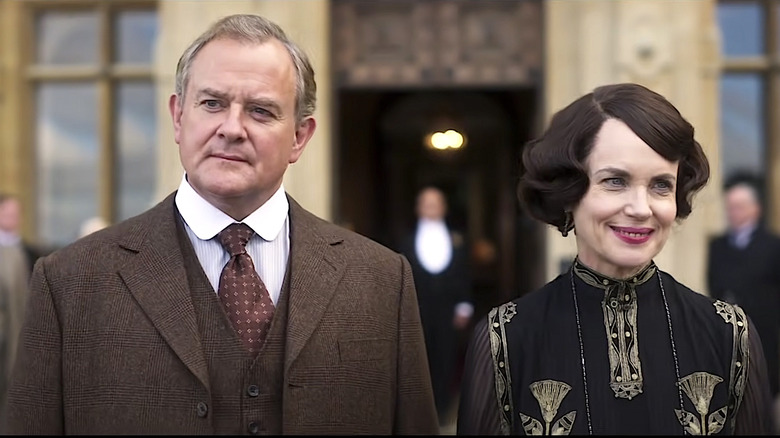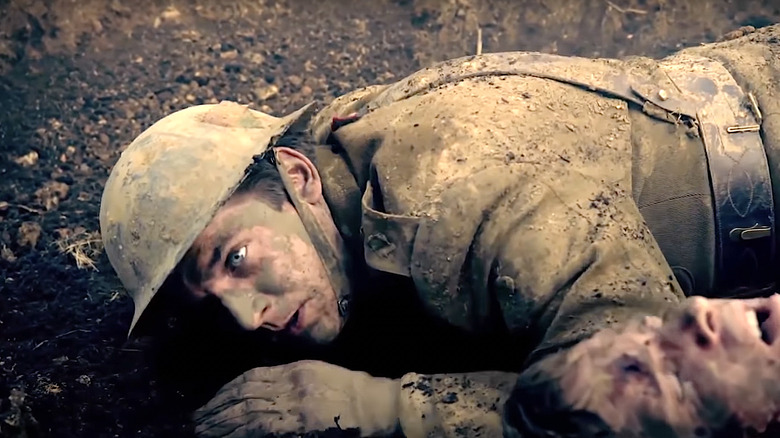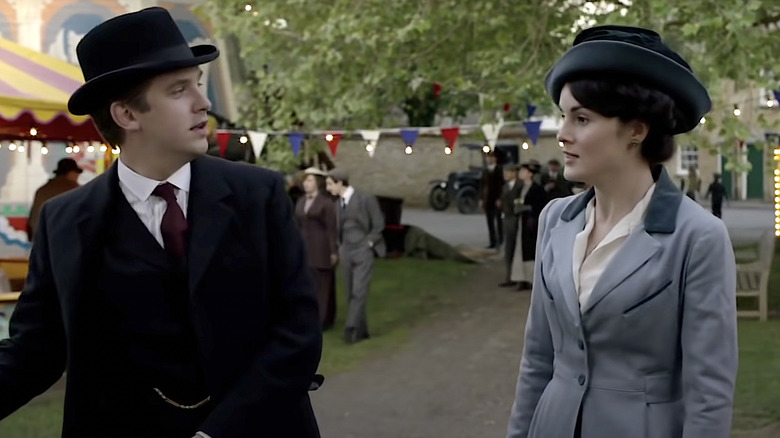Every Downton Abbey Season Ranked Worst To Best
It was surprising when "Downton Abbey" debuted in 2010 and wasn't a scathing sociological critique of the last gasps of the English caste system. As it turns out, creator Julianne Fellowes and ITV-watching Brits didn't need another reminder that keeping the working class living in the basements of the landed elite wasn't the fairest system ever devised. Something else was afoot.
See, "Downton Abbey" is the rare piece of prestige TV that doesn't preach. It grapples with topical issues, but is foremost a delightful soap opera in which the English nobility and the staff that serve them share bonds stronger than any forged in the modern workplace. As the Earl of Grantham often asserts, everyone has a master.
For the family at the center of this drama, the very existence of Downton is constantly at stake: its surprisingly dignified jobs, its tight-knit community, and its entire way of life. "Downton Abbey" is a deeply romantic vision of England, set when king and country still reigned, and when honor and culture tied society together. To globalized eyes, the pleasure is pastoral. It's a deep dose of nostalgia for Victorian prudishness, the warm bath of stuffy rules, and the cozy comfort of being sure of one's place.
7. Season 4
Season 4 is when Downton really starts looking to the future. It's a make-or-break season for Downton's younger denizens, who realize that they must embrace change or perish, and it's all a bit declinist and dour.
After the tragic loss of Lady Sybil Crawley, "Downton Abbey" added some new blood to reflect the changes happening in the broader world. Enter cousin Rose, who is the embodiment of the roaring '20s. She's not old enough to officially debut into English high society, but her teenage rebellion includes sneaking out in full flapper regalia to jazz clubs where, scandalously, she falls for a dapper black musician. At her age, any affair would ruin her prospects, and the show handles the issue with its signature light touch. Whether Rose is bucking cultural taboos or simply persuading Lord Grantham to buy a radio, she injects the footloose energy of her age into the proceedings as Downton collides with modernity.
Swinging times aside, the English aristocracy continues its grim waltz into oblivion. It's hilarious to hear about Lord Grantham's financial woes. Since work is utterly anathema to the British nobility, Robert Crawley's "man of business" must inform him that he's broke. Ironically, the super-rich in this society don't have the first clue about money. When Mary and the family's socialist-chauffeur-turned-Downton-widower Tom team up to modernize the estate's backward farming operations, and perhaps even scale back their absurdly baroque lifestyle, it may be too late.
6. Season 5
"Downton Abbey" season 5 is all about second chances at love. As Betty Draper explains to her pre-teen daughter on "Mad Men," "Every kiss with them after that is a shadow of that kiss." The absence of Dan Stevens as Mathew Crawley is never felt more than in season 5. Despite actor Matthew Goode's best efforts, his character's romance with the widowed Mary Crawley just doesn't have that will-they-won't-they sizzle.
Season 5 is also when we get a backstory for everyone's favorite granny, the Dowager Countess. It's revealed that, in her younger years, Violet Crawley had an extramarital dalliance with a Russian prince. The two are awkwardly reunited, with the prince now an aged pauper after the collapse of the Russian Empire. This is supposed to humanize the countess, but she already made a full-tilt turn from the scornful Victorian Karen of season 1 to everyone's favorite silver-tongued octogenarian in season 2. Adding a lurid affair that nearly ruined her adds color to the conformist advice she gives the single women of Downtown, but also makes her a hypocrite and undermines everything she stands for.
Then again, season 5 also features a love story for Downton's indefatigable defender of tradition, Carson the butler. Can an upper lip this stiff actually pucker up for a kiss? It seems almost inconceivable. But, since he and the Dowager Countess are still human, maybe these were necessary concessions.
5. Season 6
Happy endings are bourgeois, so that's exactly what we needed from the last batch of episodes of "Downton Abbey." Downton isn't like real life, and its climactic season gives us what we actually desire from escapist television: a grand and charming conclusion where the people we care about are taken care of before we say goodbye.
If anyone deserves luck in love, it's Lady Edith. Lady Mary and Lady Sybil's comparably homely middle sister (by Mary's cruel reckoning, anyway) goes from being passed over to knocked up and abandoned to left at the altar by an elderly suitor. But, when Edith stops being a mere lady in waiting and strikes out on her own as a publisher in London, she finds a purpose beyond bitterly skulking in Mary's long shadow. In this more flattering light, Edith meets a charming and age-appropriate man who seems genuinely drawn to her self-sufficiency. Of course, there is a problem: He's a bit middle class. But, then again, compared to the Crawleys, so is almost everyone except the king.
The ending of "Downton Abbey" rejects prestige TV conventions. It doesn't need a "Breaking Bad"-style tragedy or the artsy ambiguity of "The Sopranos." Every loose thread in this fairy tale is tied up in a neat little bow, almost as if by magic.
4. Season 3
One of the elements that makes "Downton Abbey" work is the generosity of Lord Grantham. Despite his stature, Hugh Bonneville's slightly portly figure and cherubic face make Robert Crawley a gentle figure. As the master of this great estate, Lord Grantham could rule with an iron fist, dismissing staff who displeased him on a whim and meting out cruel punishments when his willful daughters disobey. But none of this is in his nature, and since leadership starts at the top, Robert sets an example for Downton that travels all the way down the show's social ladder.
The base of this pyramid is undoubtedly the serpentine footman Thomas Barrow, who never saw an underhanded scheme he didn't fancy. Barrow's cruelty is connected to his closeted sexuality; the show takes place at a time when gay sex was literally a crime.
Barrow survives many brushes with dismissal for various plots, but when he's caught making unwanted advances on a young staffer, it appears that his nine lives at Downton are over. But, yet again, Lord Grantham surprises. Despite his necessary conservatism as the family patriarch, he takes yet another generous view of Thomas's situation: "If I shouted blue murder every time someone tried to kiss me at Eton, I would have gone hoarse in a month!" For Grantham, rules are rules, but people always matter more — even the unpleasant ones. It's this generosity of spirit that is a defining trait of this beautiful show.
3. The movie
The first "Downton Abbey" movie (another is scheduled for release in 2022) does the right thing by thinking small. It concerns a visit from the king and all the breathless hubbub that entails, and little more. And yet, that doesn't mean that the Grantham estate isn't grander on the big screen.
Aside from the gilded locations, the TV series has the hallmarks of a lower-budget production. It's cut into a stubby 16:9 rectangle to fit on your TV screen. The frame rate (25 frames per second, as is standard in Britain) also gives the camera moves a cheap, soap opera-like look. Most of the outdoor locations are filmed in broad daylight with flat, unappealing lighting. Everything, in general, is too bright, all to make the show visible for light-polluted home viewing.
The "Downton Abbey" movie gives us the chance to see the splendor of aristocratic English life in the early 20th century in its full cinematic glory. First, the film is shot in a gorgeous widescreen aspect ratio, creating a stately, nostalgic vision. More importantly, Downton suddenly has sunrises filmed by drones, sharp contrasts, long shadows, and beautifully slanted beams of volumetric light that fill all those marvelous rooms. It's as if the chiaroscuro paintings adorning the Crawley estate have come to life. This is the visual panache that creator Julian Fellowes' world has always deserved. Despite missing a few key members of the original cast, the "Downton Abbey" movie is stunning viewing for completists and casual fans alike.
2. Season 2
Despite Downton's soapy style, it covers many big issues: women's rights, class struggles, and the impending decline of royal rule. But the show's strength is always its light touch and big heart. "Downton Abbey" uses the strictures of Victorian society as a jumping-off point, and never strays far from being a delightful postcard from a bygone era. That even applies to the WWI years. Long after the conflict, even Lord Grantham's American wife Cora Crawley will remember season 2 fondly.
As the unexpected Downton heir, Mathew Crawley (Dan Stevens) is called to serve. When he's wounded, the estate's future is once again imperiled. The show spares viewers from the violence of the brutal conflict, but doesn't shy from the fact that an entire generation of young men was lost, killed in action or maimed so badly that they became unrecognizable.
Julian Fellowes isn't interested in "Saving Private Ryan"-style set pieces featuring Matthew charging into the fight. This is still a chamber drama, not a war epic. Even on the bloody front, the war mostly booms in the distance as Stevens leads from the trenches, dashing even when dappled in mud. On the home front, Downton is converted into a convalescent home for wounded vets. WWI is an all-hands situation, and the presence of casualties at Downton is more than just an omen that the Europe of old is in a fight for its life.
1. Season 1
You can't beat season 1 of "Downton Abbey." Electricity is all the rage, and the big controversy is that the Crawleys have to tolerate the company of someone decidedly middle class — a working attorney, yuck!
Julian Fellowes, himself a member of the House of Lords, introduces us to the Crawleys with the perfect metaphor for the decline of the English aristocracy: The Titanic has just sunk, and with it, the legitimate heir to the eye-popping Downton estate. With all those family jewels at the bottom of the icy Atlantic, the family must accept their closest living male relative into the fold: Lord Grantham's third cousin once removed, young Matthew Crawley, played by the incredible Dan Stevens.
After leaving the series, Stevens lost 30 pounds, or "in British terms ... about two or three chins," the actor said on "The Graham Norton Show" (via TV Guide). The extra weight above his collar is the only thing about Matthew that fits in with his well-fed relatives, who live fat on the land of Downton's vast holdings. Now that this handsome plebeian with impeccable manners and piercing blue eyes is politely joining them for their elaborate evening meals, they dine and drink and wrestle with the family dynasty's impending doom. Stevens' adversarial romance with lady Mary Crawley (Michelle Dockery) adds the sizzle, as this bold woman deals with the fact that her sexy (distant) cousin has usurped her position by virtue of having male genitalia.
